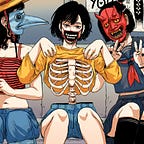What is most remarkable about the first generation experience is that it is so utterly banal. Every child is acutely aware of their socioeconomic circumstances; though it might not register immediately on an intellectual level, it certainly manifests itself on an emotional one: the underlying anxiety when the word “bills” creeps into conversation; the emotional isolation as a byproduct of a perpetually working parent; the distinct feeling that something isn’t quite right, as they watch the other kids get ready for band practice or games, quietly looking on until they become the last child in the pick-up lot.
As they get older, as their history classes cover the surges of foreign roots desperately trying to find purchase in alien soil, as the time for them nears to fulfill their singular duty, they might attempt to unwrangle the contradiction of first generation existence. How is it that my trauma, my drive to succeed, that overwhelming pressure to realize an idealism—all of which are deeply intimate familial artifacts—so widespread? How is it that my suffering so painfully, so clearly unique, while simultaneously being more of the same?
This immigrant rags-to-riches mythos is deeply ingrained within the American psychology. It is the perfect representation of the nation’s values and its ideals. A man is solely responsible for the fruits of his labor, and these fruits must ultimately be watered with the sweat of his own brow. So then, this sense of absurdity, in which the reality meets with the contradiction, this dual sense of community and paradoxic isolation, must be a natural rite of passage for the average American, must it not?
More or less. In the same way that America has become synonymous with “bigger and better,” so too has this absurdity become “bigger and better.”
It is a deeply perverse thing to force the children of countless diasporas to recount their most traumatizing family histories. It is even more barbaric when these diasporas are historically contextualized against the backdrop of US foreign policy. What a coincidence it is, to have the children of refugees created in American wars be birthed on American shores and be made to fight claw their way up the American social ladder in order to attempt to live out the American Dream. In a way, it is a sort of cosmic irony: bitterly sardonic, but funny all the same.
This isn’t even getting into the colonial perversions that underly this process. As if our intergenerational humiliation isn’t enough, as if the rape and pillage of our ancestral homelands weren’t enough, now our children must be made to beg and prostrate themselves in front of faceless college boards and indifferent scholarship committees. The reputation of the American appetite far precedes itself.
But this essay isn’t about all of these nasty, brutish things. This essay is about me. This essay is about that unrelenting feeling of anti-climax that has followed me home, all the way from the commencement stage up until now.
This degree has been used as a physical representation of the American Dream for as long as I can remember. Always slightly out of reach, but not so far away enough that my fingertips don’t brush against its dark wooden frame from time to time. I’m not chasing ghosts any longer. My family and I don’t have to wonder, or pray, or hope anymore. And yet everything is gone, the sole purpose of my existence up until this point unceremoniously exchanged for a piece of paper scarcely larger than a standard printout.
In the same way that cotton candy vaporizes other running water, so too has that foreboding sense of pressure, the familiar presence of anxiety. When you grow up with demons like these, they almost feel like old friends as soon as they’re finally exorcised.
I can intellectualize these things as externalities of a capitalist mode of production. I can explain them away as products of a culture so hyperfocused on productivity and self-advancement that it is willing to sacrifice anything for the impossibility of everything. I can tell myself that I am the result of things and means far beyond my control and that I am still a victim. All of these things are more than adequate explanations.
But I can’t. Now I have to find a job. A house. Someone to marry. Maybe have kids with. And so returns that familiar weight upon my shoulders.
Hello, friend. I almost missed you.
